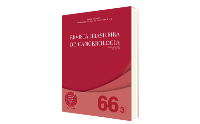Intake of Ultra-Processed Foods by Women Surviving Breast Cancer
DOI:
https://doi.org/10.32635/2176-9745.RBC.2020v66n3.1092Keywords:
Food Consumption, Industrialized Foods, Food Quality, Breast Neoplasms, SurvivorshipAbstract
Introduction: High prevalence of breast cancer in Brazil along with the increase in intake of ultra-processed foods suggests a narrow relation between these two factors. Objective: To evaluate the intake of ultra-processed foods in women surviving breast cancer. Method: Cross-sectional study with 100 women with breast cancer followed at an oncology treatment center. Based in a food frequency questionnaire, foods items ingested were grouped in in natura, processed and ultra-processed, according to NOVA classification. The energetic contribution of each food group was given by the ratio between calories from the group and total calory. Patients were categorized in high and low intake of ultra-processed and the differences between the two groups (categorical variables) were tested by Pearson’s X2 test. The relationship between calories intake from ultra-processed foods and the intake of energy and specific nutrients was based inn linear regression models adjusted per age, education and body mass index. Results: Of the calories ingested by the patients, 27.1% were ultra-processed foods. Those with high ingestion of ultra-processed foods had lower intake of protein (p=0.0372) and fibers (p=0.0458) and higher intake of polyunsaturated fat (p=0.0019) and sodium (p=0.0068). The ingestion of ultra-processed foods was related to lower intake of in natura foods and higher intake of sodium, total fat and its fractions (p<0.05). Conclusion: Women who survived breast cancer had one third of their diet formed by ultra-processed foods associated with reduced intake of in natura, proteins and fibers.









